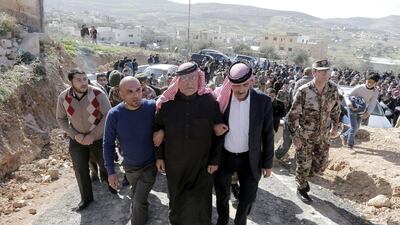AMMAN // King Abdullah of Jordan on Wednesday pledged a “relentless” war against ISIL on the extremists’ own territory,
The king cut short a visit to the United States and flew home to direct Jordan’s response to the murder of Lt Maaz Al Kassasbeh, 26, the air force pilot burned alive by ISIL militants.
“We are waging this war to protect our faith, our values and human principles and our war for their sake will be relentless and will hit them in their own ground,” the king said after a meeting with military chiefs.
King Abdullah was met at Amman airport by thousands of supporters amid an outpouring of anger in Jordan after ISIL posted video footage on the internet of the pilot’s barbaric execution.
Two Al Qaeda in Iraq militants, Sajida Al Rishawi and Ziad Al Karboul, were hanged at dawn on Wednesday in retaliation. The pilot’s father, Safi, said the two executions were not enough and demanded a stronger response.
“I ask that the revenge be greater and that this criminal group be annihilated,” he said.
Jordan had been prepared to release Al Rishawi, a failed suicide bomber, in exchange for Al Kassasbeh – but ISIL killed the pilot on January 3, 10 days after he was captured when his F-16 crashed in north-east Syria.
“There were, of course, even before the killing of the pilot, many voices that said this is not our war,” said Marwan Muasher, the former Jordanian foreign minister and ambassador to Washington. “They are not going to disappear, but I think these voices will be weakened. Jordanians are not accustomed to violence and certainly not that kind of brutal violence.”
Supporters who met King Abdullah at Amman airport on Wednesday also dismissed ISIL’s attempt to sow discord.
“I felt the way that Daesh killed the pilot was targeting the unity of Jordan,” said Mahmoud Al Majali, 22, from Karak, referring to ISIL by an alternative name. The pilot’s killing went beyond any understanding of the brutality of war, he said.
“War is always to win and lose. There are the two sides, but sadness came because of the horrible way they decided to kill him.”
Suleiman Al Zaben, an MP who represents the Bani Sakhr tribe in parliament, said the crowds gathered along the road to the airport aimed to show they were not afraid.
“This shows how the people of Jordan are united and it gives us more power to fight the cruelty of Daesh, who believe only in fire,” he said.
Al Kassasbeh’s murder provoked widespread regional condemnation. ISIL was described as a “satanic terrorist group” by Ahmed Al Tayeb, the grand imam of Al Azhar in Egypt.
Syrian Kurdish fighters in Kobani described the pilot as a martyr.
“After the killing of Maaz was announced, troops from the People’s Protection Units in Kobani and in liberated villages near by gathered to mourn the pilot’s death, and to hold a minute of silence in his honour,” Mustafa Ebdi, an activist, said.
“He is one of Kobani’s martyrs – everyone is proud of him.”
King Salman of Saudi Arabia said the killing was “inhuman and contrary to Islam”.
Mr Muasher said he expected Jordan to intensify its military effort against ISIL in the short term. “We are going to see a sustained military campaign against ISIL by Jordan.”
But he said defeating the militants would require a long-term strategy of countering their “barbaric” ideology with a respectful one.
Rami Khouri, a Middle East expert at the American University of Beirut, said Al Kassasbeh’s death was likely to lead to “some kind of greater strategic effort by all the people who are fighting against ISIL to get more serious, to get tougher, to get more realistic on the ground and take the fight to them.”
jvela@thenational.ae
* Taimur Khan reported from New York. Additional reporting by Reuters, Agence France-Presse and Bloomberg News

